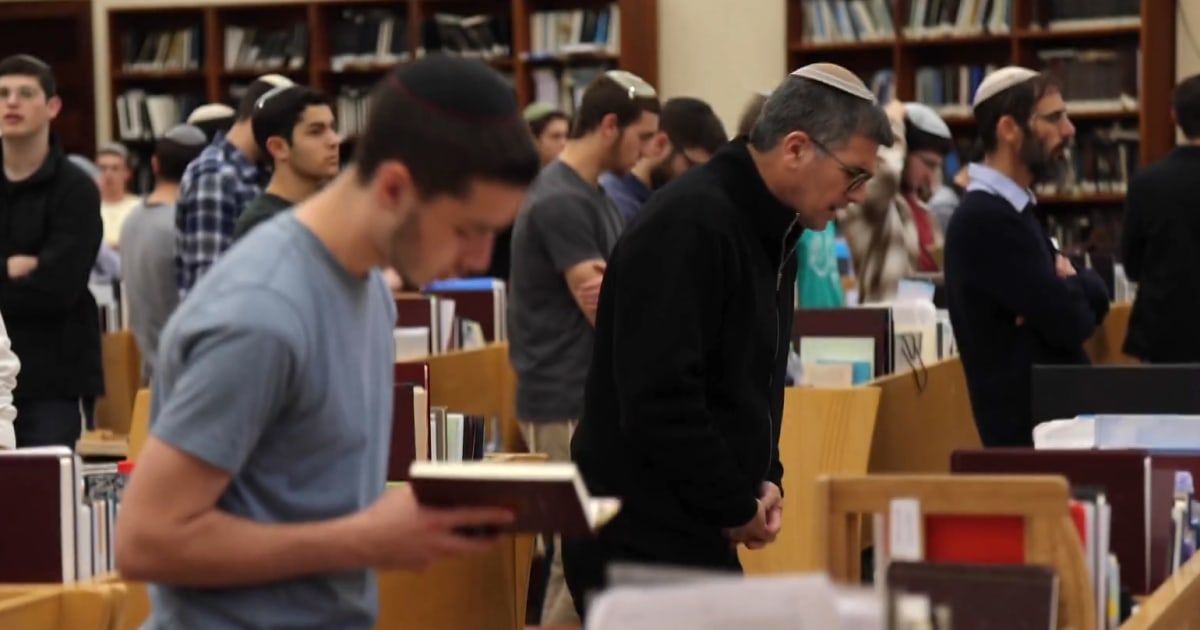YERUCHAM, Israel — Peering over tightly packed rows of books in the great hall of the white-brick seminary, the students pause their study of the Torah and Talmud each day for afternoon prayers, chanting the same words that Jews have been recited for centuries.
But these days, as the young men rock back and forth gently in worship, they add a new prayer.
“May the one who blessed our forefathers bless our soldiers standing guard from the Lebanese border to Egypt, from the sea, air and land,” they pray in Hebrew. “God will look after and save our soldiers from the enemy.”
Yet not all are saved.
At Yeshivat Hesder Yerucham, a seminary for young men in Israel’s Negev desert, eight students have already been killed in the Israel-Hamas war. The eighth died just last week.
It’s a crushing loss for the community of some 300 students, aged from around 19 to their early 20s.
Gilad Palmer, a teacher at the yeshiva, told NBC News last week that members have been “going from funeral to funeral.”
“Judaism is a religion that believes in life,” Palmer said. “We celebrate the life and not the death. But we also know that sometimes we have to pay the ultimate price for our people, our nation.”
Recalling the first of his students to die in the war, Palmer said Ariel Eliyahu, 19, was “always smiling” and “always searching to volunteer” within the school. He died when his tank was struck by Hamas fighters on Oct. 7, Palmer added, the day the militant group launched multipronged attacks on Israel that killed 1,200 and saw 240 kidnapped.
That so many students join Israel’s military is a point of pride for this yeshiva, where roughly 95% of the student body is ultimately drafted into combat units, the school said. Palmer said while it may seem counterintuitive for a religious institution to prize military service, it fits neatly into the ideals of selflessness and caring for others that the school strives to promote.
“It comes from the same values that you know that you’re there for each other,” he said.
Yet within the complex tapestry of religious Israeli society, such high levels of military service are relatively rare.
Among the ultra-Orthodox, known in Israel as Haredim, the vast majority do not serve in the Israel Defense Forces, having been granted legal exemptions — a major source of conflict between the country’s ultra-Orthodox and secular Jews.
Out of a population of more than 1.2 million ultra-Orthodox, as few as 1,200 have been drafted annually in recent years, according to the IDF’s Manpower Directorate. In December, just 188 ultra-Orthodox Israelis were recruited, the IDF said.
Within Israel’s modern Orthodox community, which includes Yeshivat Hesder Yerucham, military service is more common. Modern Orthodox, a distinct stream of Judaism, share with the ultra-Orthodox a commitment to abiding by traditional Jewish law, but tend to participate more fully in broader Israeli society and engage more directly with the secular world.
Those yeshiva students who do opt to serve generally enlist under an arrangement with the IDF known as the “hesder,” in which students alternate between periods of army service and full-time religious study.
When NBC News visited Yeshivat Hesder Yerucham, a group of students took a break from studies when a classmate now in the military returned for a visit. His white tzitzit, or knotted Jewish tassels, dangled from above the pants of his green IDF uniform.
He was greeted like a hero on the front steps by his classmates, including Yehuda Corn, 19, whose older brother is currently in the IDF and stationed in the occupied West Bank.
“We all view it as our obligation to serve and to protect our families,” Corn said.
Corn said that on his first day at the yeshiva, he found an empty spot in the great hall and placed his belongings down. At the seat next to him was Eliyahu, who on Oct. 7 was stationed in a tank near the Gaza Strip, where his unit fought off infiltrating Hamas terrorists.
When their tank was struck, Eliyahu was killed, one of the first to fall in a war that has amassed devastating losses for both sides. Officials in Israel say more than 500 soldiers have been killed in Gaza since the war began. More than 22,000 people have been killed and over 55,000 injured in Gaza in the same period, according to the Palestinian Health Ministry.
In four months, Corn said, it will be his turn to enlist. But he said having already lost so many classmates in the war meant he didn’t think twice about being drafted.
“It only strengthens the feeling of obligation, responsibility,” he said. “It’s scary. But it also motivates me to also dedicate harder to learning and to fulfill my responsibility and do my part.”
Pausing pensively, he added: “So it’ll be my turn, and I want that. It’s important.”
In Mitzpe Yericho, a religious settlement in the occupied West Bank, Ariel Eliyahu’s father Achiya, a rabbi, said he viewed serving in the Israeli army as a commandant passed down from God.
“For us, this is the way to live the real religious life,” he said. “You cannot rip the Torah in two and say, ‘This part, I obey, this part, it’s not none of my business.’ For me, it’s one part.”
Recalling Oct. 7, Ariel’s mother, Idit Eliyahu, said it was the Sabbath, when observant Jews stop using electricity and cellphones. So they only learned the extent of the terror attacks after the Sabbath ended in the evening, she added.
She said they spent a sleepless night awaiting word of their son’s whereabouts, before two soldiers knocked on their door the next day to deliver the devastating news.
“If you ask me if I would do it again, yeah, I would send him again,” she added. “Because this is our land, and this is what we have to do.”


